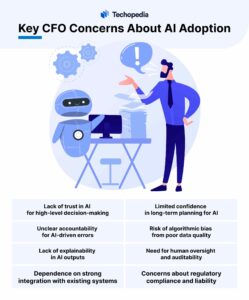For years, chief financial officers (CFOs) have relied on spreadsheets, instinct, and human judgment to guide business strategy. But the rising pressure to deliver faster, data-driven decisions is putting many of them on the radar of artificial intelligence (AI).
A new report by Pigment, a platform that helps businesses plan their strategy, has shown that more than half of finance leaders would consider input from AI in corporate finance decision-making.
Yet, even as AI finds its way to many finance functions, trust remains a complex issue that worries the decision makers.
Here is a look into how AI has shaped corporate finance today, and why some CFOs are approaching the technology with caution.
Key Takeaways
- CFOs are increasingly open to using AI, but many remain cautious about trusting it with high-level decisions.
- Despite its benefits, long-term trust in AI is limited due to concerns over accountability, bias, and transparency.
- Many finance leaders aren’t confident in planning AI adoption beyond six months.
- Human oversight, explainability, and data quality are essential to making AI dependable in finance.
- Regulatory pressure is pushing finance teams to adopt responsible AI practices with built-in controls and documentation.
Table of Contents
Table of Contents
How AI Tools Are Restructuring Finance Teams
Traditionally, finance has relied on structured processes, historical data, and rules-based decision-making. However, as AI continues to breathe new life into everything, finance teams look forward to enjoying some AI-driven predictive insights, anomaly detection, and real-time data processing.
According to a survey by KPMG, about 70% of finance leaders admit that AI and generative AI are the most crucial technologies for enabling strategic decision-making in finance.
As Greg Homen, AI Transformation Program Leader for Tax at KPMG LLP, explains:
“GenAI can automate processes such as data capture, computation, and reconciliation, freeing tax professionals from routine tasks and enabling them to contribute more meaningfully beyond compliance.”
Pigment holds a similar view, as their survey revealed that 72% of finance leaders now see AI in financial planning as a key enabler for strategic decisions. In addition to that, roughly four out of five of the leaders are already deploying or planning to implement AI tools.
Why CFOs Are Still Cautious About AI


Despite the momentum in AI adoption, many CFOs still approach the technology with measured caution. Trust in AI is not yet automatic, especially when it comes to strategic or high-risk decisions.
James Daniel Best FCCA, CEO of Centaur Dynamics, stated in a recent blog post that “simply understanding how AI makes decisions does not guarantee confidence in its outputs.”
While AI brings speed and scale to finance functions, it’s yet to offer the long-term clarity CFOs need. This is clearly seen in the Pigment report, where 80% of finance leaders said they are not confident in planning AI inclusion beyond six months. And for the 10% who feel secure, they only admitted planning for two years into the future.
CFOs also want accountability for every decision their team makes, whether using AI tools or not. Many finance leaders have concerns over who will take responsibility if something goes wrong while using AI. Should they blame the team, the system, or the AI vendor? These unresolved questions create hesitation around deep AI integration, especially for decisions that carry significant business consequences.
Another concern CFOs have on AI integration is algorithmic bias. AI models are known to reinforce errors when they’ve been fed with flawed data. If CFOs are not able to monitor the data fed into their AI system, then there’s a risk of having flawed output as well.
Jay Peir, Head of Strategy and Interim CFO at Pigment, noted that for finance teams to unlock AI’s full value, they need to move past the enthusiasm that the technology brings.
He advised companies to ensure they feed their AI systems with quality data if they want to get a quality outcome. He also noted the importance of making sure AI tools are well-integrated in the existing systems.
The Future of AI in Finance Will Depend on Transparency & Control
Finance is one of the few sectors that require accuracy, transparency, and reliability of data.
For AI adoption in finance to remain effective, it must give room for human auditing. It is vital that CFOs understand how the tools they use produce their data or even make assumptions. A little mistake in finance data can result in huge financial costs to any firm. At that point, the AI system may not be blamed, but the humans who oversee its output.
According to Pigment, AI agents in corporate finance shouldn’t act unguided. Rather, they should function only as a co-pilot that supports analysis, forecasting, and recommendations, while leaving critical decisions to human oversight.
Deloitte emphasizes that maintaining “human oversight and transparency… are two pillars of reliability and trustworthiness” when it comes to AI-generated financial data.
This approach is already at play among many finance teams. A recent Gartner survey found that 58% of finance functions now use AI, with a growing focus on customizable models, error detection, intelligent automation, and forecasting tools, all of which benefit from close monitoring and human supervision.
So, rather than adopting generic, plug-and-play solutions, organizations are choosing platforms that give humans the ability to configure what they need. This approach is better, since it not only helps to reduce operational risk but also allows finance teams to build confidence in AI systems.
The Bottom Line
Despite being a cautious experiment, the role of AI in finance will continue to grow, but on the terms defined by trust, governance, and control.
Until the risks of bias, data reliability, and explainability are addressed, CFOs will probably keep AI under close scrutiny, especially where corporate liability is concerned.
For AI to evolve from an assistant to a strategic partner, it must demonstrate not only its intelligence but also its dependability.







